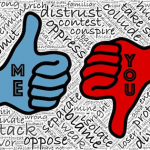
FAROUK A. PERU (Muslim, blogger at Person al Islam, Patheos Muslim): Kaveh, you describe yourself as an ‘anti-theist’. According to what I understand by the term, this means you actively oppose any belief in a deity. May I ask why, please?
KAVEH MOUSAVI (Ex-Muslim atheist, blogger at On the Margin of Error at Patheos Atheist): There are many reasons, but to keep it simple, the very idea of a superstitious belief in a being that (I believe) cannot be scientifically proven, can be harmful for society. We need to encourage critical thinking and we need to stop privileging certain ideas, and to believe that some ideas are sacred, there’s an undeniable amount of privilege involved. Since I think this privilege is harmful, I disagree with theism as a whole.
Do you believe that I go too far? Or do you think that the idea of God is not a privileged idea?
Farouk: Firstly, I’d like to thank you for teaching me the word ‘privileging.’ I never knew that ‘privilege’ can be a verb! I certainly see it’s a very useful term.
I empathise with much of what you say. How can I not? Much harm has been done in the name of God. However, is it the idea itself or, as you may say, the privileging of that idea? For me, it is the latter. I actively oppose any kind of privileging on metaphysical ideas. As a Quranist, I reject Sunni and Shia authorities in Islam. To me, it is imposing the authority of man onto (what we believe to be) a divinely inspired text.
On the notions of ‘superstition’ and ‘scientific’, again I can empathise with you. Science is something tangible, material. It is objective for those who agree upon that the experiment is valid. But is the validity of the experiment a given? This we need to critically ask as well.
About superstition, I agree that in most cases, ‘god’ is a superstitious belief. However, I subscribe to the idea of a metaphysical gnosis. In other words, we can come to a divine realization. Of course, I will be the first to admit this cannot be proven.
Kaveh: That’s all very intriguing. However, I hope that you can see that a divine revelation or a metaphysical gnosis is a very difficult concept for someone like me to accept. I have never had an experience which might lead me to question the materialist fibre of the world. Why do you think God has not revealed Himself to me? And also, isn’t this unfair to atheists like me, to be deprived of a source of knowledge that many believers have (if there is a God)?
Farouk: Well, as you can see, I did say ‘I will be the first to admit this cannot be proven’. It is a subjective experience and this is the word we must focus on – experience.
To answer your question, I cannot make such a guess as to why you reject the notion of a god. Human beings have infinite factors that combine to make the totality of their selves. Please note that I am in no way asserting the superiority of a theist over an atheist. To me, a person’s worth is judged by his character, how he treats the rest of the world (including animals, plants and the earth itself).
As to the question of fairness (divine justice), I do believe that God will judge us based on our sincerity. Perhaps your human evolution lies on a different path, but you’re still a human being and can think for yourself.
Kaveh: I’m afraid I didn’t find your answer very convincing. I admire your egalitarian attitude toward apostates and I applaud you for it, as I think we need to improve upon that in Muslim communities, and I’m very glad that you are providing a better example.
But apart from this and about our disagreement: If I were an omniscient and omnipotent God, I’d reveal myself to all people in a way that no question is left about my existence. Why reveal myself only to a selected few? The question of God is very important, and it’s unfair to leave people in the dark about it. Of course this gets much worse when some people say atheists will go to Hell – which you don’t. But even then, why keep some people more ignorant than the others? I’m a curious person, if there’s a God who reveals Himself through revelations, I feel slighted not being revealed to.
Farouk: I totally understand that you won’t find my answers convincing. We operate in two different criteria of knowledge (in philosophical terms, epistemology). Hence we will not judge information in the same way.
However, one thing I feel we should acknowledge though is the fact neither one of us can officially speak for this entity we call ‘god’. What I offer are simply my opinions on ‘god’ through my reading and interpretation of the Quran. We do not have a person called ‘god’ who can either confirm or deny whatever i say about him or her. The same goes for you as well.
So that leaves us with assumptions and I would like to point out the assumptions you have made thus far:
- That God needs to have his existence acknowledged. What makes you think he cares at all?
- That he would punish atheists, or people who believe in a different concept of God, by sending them to hell, let alone an eternal one
- That it is God who keeps us ignorant. I am imputing anything but you have thus far precluded the factor of human inclinations. I am as susceptible to it as you are, of course.
I do not fault you for these interpretations. But they do largely come from Conservative Traditional Islam. I just wanted to point that out.
Kaveh: All right, I’ll try to respond to the three points you’ve raised. I don’t know how you picture God, but I assume you picture Him as omnipotent, omniscient, and omnibenevolent. If God is omnibenevolent, then He has to care for our knowledge of Him, because it would be immoral for Him to hide Himself from us. It’s a form of deception. Especially since He can see how people are engaged in wars over Him, it would be His responsibility to settle this debate and end the many sufferings caused by religious divisions in the world.
If God is omnipotent, then He can end our ignorance. If there’s a human obstacle toward it, then he is not omnipotent.
Of course it is possible to imagine a God who is amoral, or incapable of ending ignorance. But then, how would that God send us a book like Qur’an or make the spiritual revelations you speak of? I think here we reach a contradiction in your positions.
Farouk: I’m sorry, but I feel that you may be missing my point here. My point was this: The descriptions and deductions we make about God are in fact what WE make about God. God did not acknowledge these projections at all. We made them and have no way of objectively proving them.
Yes I believe God to be omnipotent, omniscient and omnibenevolent, but also I believe His will to be the defining criteria of those characteristics. His omnibenevolence is not subject to my assumption about it. It is rather on his terms. Another problem arises with the issue of omnipotence — that is the limitations of our logic. We may ask, for example, can God cast us out of his domain? If we say yes, then we are proposing a limitation to his domain. Hence I do not believe logic is an adequate tool to measure these ideas.
You mentioned the possibility of a god who is ‘amoral’. May I ask you, by whose criteria of ‘morality’ are you operating?
Kaveh: But here we reach a dead end, don’t we? Logic is the only (reliable) tool we have to understand the world, and if I cannot use logic and morality derived from that logic to judge the concept of God as you present Him, then what option is left for me but to blindly accept your words? I should just accept that your interpretation of God is just, and I cannot truly question Him because he is beyond my understanding, beyond my reason, beyond my principles of right and wrong.

And we circle back to the original question. This is why I’m an anti-theist. Because ultimately you claim that there’s a concept greater than human knowledge and human morality, and I cannot accept that. That’s a harmful way of thinking about the world. Now, you are a very progressive thinker and your concept of God in itself is not very harmful, but you leave the door open to the more harmful ones. If we are to just “accept” God, then why should we accept yours and not the God of conservatives? I don’t think that faith is a virtue, and I think while your concept of God is not very harmful, it’s still harmful to the extent that it neuters human reason.
As for the concept of an amoral god: I can imagine a god that’s a natural phenomenon and like a hurricane or an earthquake has caused the world to appear, but it has no morality, and I think this concept is much more reasonable than a concept of a rational and benevolent God. (done)
Farouk: I don’t believe we have reached a ‘dead end’ but rather a ‘fork in the road’. I’m sorry for being pedantic here, but I feel it’s necessary to make a point. ‘Dead ends’ imply that we have no progress to be made. A ‘fork in the road’ means we can keep progressing, but only on different paths.
You say that ‘logic is the only reliable tool’ but I have to ask, logic programmed by whom? Like any computer, logic is a tool waiting to be fed information so as to produce results. If you say, for example, if God existed, there would be no evil and suffering in the world and claim this to be ‘logical’, then why can’t I make a similar claim by saying ‘evil in the world is our test, hence we need to overcome it to pass’? Why is my logic unacceptable but yours is?
Of course you are free to use your reason—that is not the issue here. The issue here is, why is your reasoning considered to be ‘logical’ while other processes are less so? Could the answer go back to the question of authority? If so, would this not make atheism a religion in itself?
I’m sorry but I have not asked you to accept my understanding of God, let alone blindly. Instead, I am saying, there are infinite paths to higher consciousness and if it suits you, you could explore them. To me, as long as you are a peaceful human being to me, then I will try to treat you better or at least, in a similar way. This is what the Quran teaches me.
Here, if you don’t mind, I would like to call to your attention your thinking pattern and how perhaps you need to question your own definitions. You say a God ‘that’s a natural phenomenon’ and acts like one ‘has no morality’. What definition of ‘morality’ are you subscribing to and would you claim this to be objective? If so, how?
Kaveh: Your logic just does not work. Evil as a test still leaves God as evil, because He ends up like the main villain of The Saw franchise, who tortures people with suffering to play a game. I don’t think saying that the religious reasoning is weak and fails miserably leads to the conclusion that atheism is a religion. What I’m saying is that your God is not coherent, that your God’s attributes contradict themselves.










